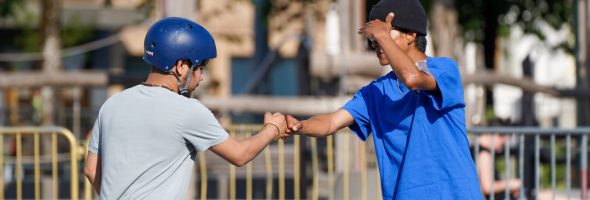Every journey is marked by highs and lows. My personal approach to coping with challenging times involves giving back as much as possible, with the strong beliefs that these efforts will eventually uplift me in return.
This perspective led me to embark on a significant venture two years ago, with the support of friends, by establishing the association known as “Rookie Slash.” The primary objective of this endeavor was to foster the inclusion of young migrants in Geneva, Switzerland, through various board and outdoor sports such as skateboarding, climbing, or slacklining. It is known that each of these sports is associated with a community that embodies inclusivity and positivity. Additionally, these activities often take place in playful spaces, like skateparks and climbing halls, which facilitate social interactions. This setting allows newcomers and locals to connect with one another, strengthening the social tissue of the city in return.
Thanks to these experiences and other personal growth, I am happy today.
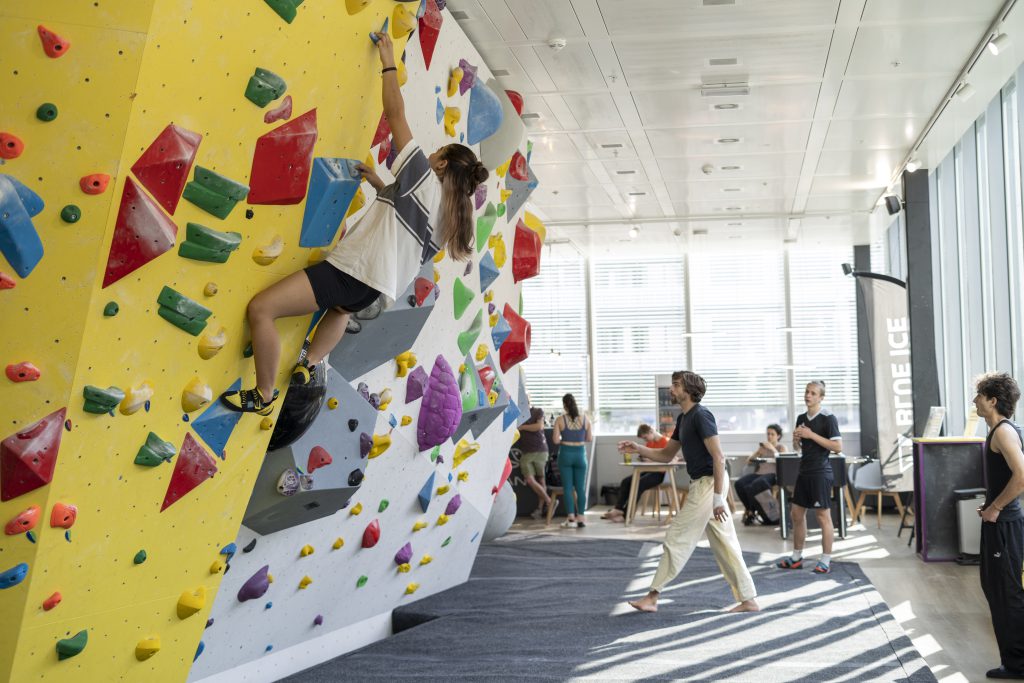
A snapshot of one of Rookie Slash’s climbing classes.
Part of the journey of Rookie Slash is our involvement with a network, I wish to keep anonymous, dedicated to supporting organizations promoting inclusion, empowerment, and inclusivity through sport, connecting formal education with sports classes. On their website, one can find online resources, workshops, videos, a forum to share information and news. etc…As a part of this network, we engaged in monthly calls, with the prospect of connecting different organizations working with migrant communities. Our means of communication predominantly relied on the digital world, including Zoom calls, shared document collaboration, and online brainstorming sessions.
In this context, Information and Communication Technology (ICT) seems like a valuable gift to us, as a small organization. The reliance on modern technology is the cornerstone of this initiative, as it enables us to exchange knowledge on best practices for our programs, enhance safety measures, address concerns and solutions related to fundraising, and strengthen our organizational structures. Thanks to this, our organization has had constructive discussions with similar programs in totally different countries: Lebanon, Palestine, Greece… This has truly opened our perspectives.
However, it is crucial to consider other aspects. What are the potential drawbacks associated with the increasing reliance on ICT in the context of small NGOs, and how do these challenges affect the organizational structure and mission? While I could offer my personal speculations on this matter, the most comprehensive understanding can only be derived from exploring academic perspectives. Therefore, I delved into academic research.
Who would have thought it could reshape my understanding of Rookie Slash?
Exploring the Role of Blogging in the Development Sector
Exchanging and discussing topics related to the development sector online is not a novel concept, and there are various ways to do so. In this discussion, we will draw a comparison with blogging, a subject that researcher Denskus frequently explores. While the connection between the exchanges facilitated by networkand blogging is somewhat limited, the program provides a platform for written expressions on specific subjects that are shared monthly among various individuals in different organizations. Although I acknowledge the limitations of this comparison, I believe it still highlights intriguing nuances regarding the benefits of ICT in the context of the development and aid sector.
Denskus notably asserts that “engaging with online social media in the form of curating a regular development blog column is a simple yet effective way to offer decolonized resources within the realm of development studies teaching, research, and communication” (2019, p. 1). The author argues that one advantage of blogging is its capacity to broaden the scope of classroom discussions and use technology to connect with diverse voices and locations. In an academic context, it allows for a diversity of content, showcasing positive stories, everyday lives, and projects, which serve as valuable resources. In the context of Rookie Slash and our affiliation with the network, I couldn’t agree more.
In an earlier work (2013), Denskus & Papan discussed the significance of blogging in shaping discussions related to international development on the Internet. The authors believe that blogging plays a substantial role in providing insights into how development is discussed outside of established academic and official communication channels. While the nature of exchanges in the network differs from blogging, as they are more formalized and channeled through specific group activities, we can still recognize similarities in terms of unconventional communication channels, with a setup that encourages the emergence of new ideas and innovation in our field. What’s more, these interactions enable us to improve our practices on an individual level. In this sense, we agree with Denskus and Papan’s recognition that “the knowledge gained from the blogging process often feeds back into individual work practices” (p. 462).
Denskus and Papan acknowledge the limitations of such practices. Firstly, these exchanges often happen among a “global elite of professionals engaged in development or students at universities” (P.465). Secondly, individual reflections tend not to influence organizational change, thereby falling short of challenging the status quo. From a different perspective, it is the discourse and core beliefs that can be subject to scrutiny.
One of the Rookie Slash participants learns to drop-in during a skateboarding class.
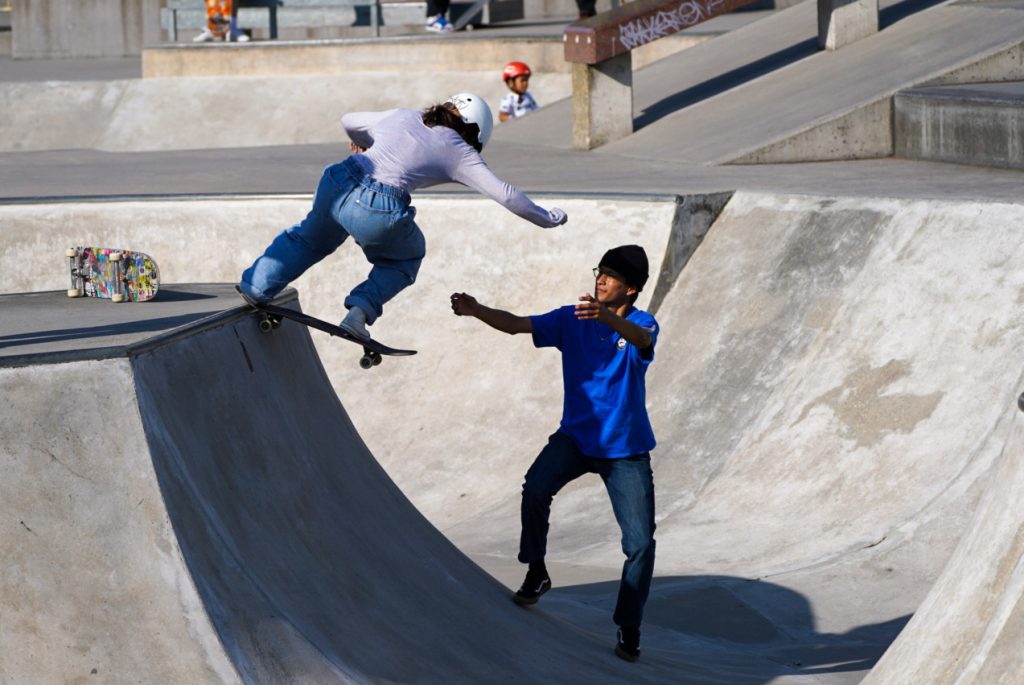
The New Spirit of Communication for Development
Noske-Turner (2023) defends the presence of “a new spirit within media and communication for development and social change (MCDSC).” Drawing on existing literature, Noske-Turner recognizes an ethos that justifies capitalism as a common good and celebrates leaders who promote charisma, creativity, flexibility, and social commitment. This mindset would draw on entrepreneurial worldviews and use capitalist mechanisms in MCDSCs for the betterment of the common good. The author labels this approach as “communication for social changemaking.” Heavily influenced by business management literature, this ethos emphasizes the role of “changemakers” as heroic leaders for positive change. Alongside capitalist values, communication for social changemaking, according to the author, tends to prioritize individualism over community involvement. Responsibility for ensuring social justice shifts from the community to the individual.
Returning to our case, the mission of the network is defined as “to support and share knowledge among projects worldwide, so that we can make a bigger impact together.” The network offers « training and advice to grassroots and established projects via online resources, workshops, support calls, and awards.”
The terminology of “impact,” “established projects“, “workshops,” and “awards” resonates with what Noske-Turner would categorize as communication for social changemaking. The website mentions “professionalization” and “sustainable growth“, a vocabulary reminiscent of the “social entrepreneurship” discourse outlined in the literature by Noske-Turner. As the author points out, such social entrepreneurship discourses and values have permeated the MCDSC field in various ways, influencing strategies, goals, funding terms, and methods in media for development, media development, community media, and participatory communication. The ultimate aim is to enhance impact, increasing the reach, and improve the effectiveness.
Be better. Be more. Always.
How does this impact our work at Rookie Slash?
In the network, we discuss Key Performance Indicators (KPIs), outreach strategies, and fundraising approaches are all vital topics. Rookie Slash recently formulated a 2-year strategy aimed at fortifying our organizational structure to ensure a long-term impact. Our fundraising approach follows this trajectory, featuring a two-year agreement with criteria that may evolve based on performance. We proudly embrace our role as young “social entrepreneurs” and have been recognized with a local award as the preferred “youth organization” among the public. We emphasize our growth, highlight the number of outings and activities, and quantify our impact through questionnaires. Rookie Slash is not just a product of communication for social changemaking; it is communication for social changemaking. This realization is disconcerting.
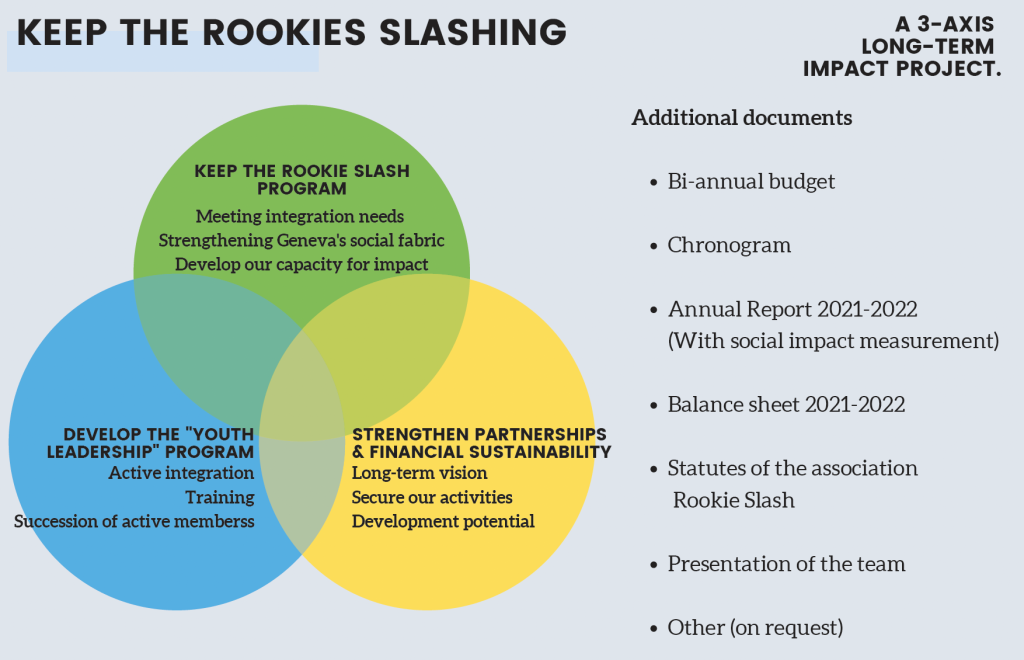
The Rookie Slash biannual strategy model.
It’s challenging to determine to what extent external factors have driven our organization into this dynamic. Undoubtedly, we have shaped our discourse and vision through our immediate environment. It’s also possible that the dynamics fostered by the network, collaborating with colleagues worldwide, have played a role. I indeed notice a generalization and conformity of practices within our niche activity. Instant and recurrent communication, all facilitated by ICT, fosters the quality and frequency of exchanges, enabling us to bridge geographical gaps and become more alike : The way we organize, define objectives, and implement leadership methods etc.. Everything becomes similar.
However, this perspective tends to overlook cultural and geopolitical differences among organizations. Furthermore, as Noske-Turner (2023) points out, many organizations have shown interest in these entrepreneurial approaches with practical and effective methods. This, however, reveals interesting similarities: the standardization of a development vision.
In 2021, Peace Direct, an international organization promoting peace-making, released a report titled “Time to Decolonize Aid,” offering insights and lessons from a global consultation on the aid sector. The report warns that “practices and attitudes in the aid system mirror and are derived from the colonial era, which most organizations and donors in the Global North are still reluctant to acknowledge” (p.4), resulting in unequal power relations between the Global North and Global South. This can manifest in the vocabulary and terms used in the field, such as “capacity building” and “expert,” which objectify and delegitimize the Global South. Moreover, the report points out that « programme and research design are rooted in Western values and knowledge systems meaning that many programmes inadvertently create a standard based on the West that communities in the Global South are required to meet. Local knowledge is, by default, devalued.” (p.5).
While the report does not directly link Noske-Turner’s “communication for social changemaking” to “Western Values and knowledge systems,” I argue that there is not only a correlation but also a direct connection. Without delving into historical details, Western Values are closely linked to the capitalist system, making them strongly intertwined concepts. In our case, I believe that the discourses surrounding the development of organizations within the network are themselves influenced by these Western Values. Consequently, the advice, connections, and “intercultural” exchanges represent the culmination of a process that reinforces practices, attitudes, and visions aligned with Western views. As the report by Peace Direct mentions, this not only raises concerns about neocolonialism but also structural racism and the autonomy of the Global South, or anyone participating in such programs.
Me, the blog’s author, teaching the basics of snowboarding to one of the Rookie Slash participants at Winter Camp 2023.

What a revelation! Putting all of this into perspective on a personal level, I realize how culturally biased my involvement in developing the association has been. Fundamentally, taking an active role in supporting the organization places me in the category of the now-familiar “social entrepreneur ». As I mentioned earlier, giving has always been my way of coping with personal challenges. Is it because I now feel recognized within my own community, rather than doing something I believe being the good ? Am I even doing any good by participating in this endeavor? Or participating in the perpetuation of structural racism?
Examining Rookie Slash’s approach toward its participants would be highly interesting. However, as a co-founder, I am probably in the wrong position to critically analyze such an issue. Nevertheless, I now have an answer to my question: ICT has indeed influenced the organization. In addition to all the benefits mentioned earlier, such as improved collaboration and cultural exchanges, ICT has likely contributed to a form of conformity, based on Western Values and the idealization of social entrepreneurship and capitalism.
Some solutions for a new vision
Fortunately, Peace Direct’s report doesn’t only bring forth challenges but also provides practical recommendations to address these issues. While their focus primarily pertains to international NGOs, I believe that, even at our level, Rookie Slash can derive benefits from some of these suggestions.
First and foremost, as recommended by the report, we should acknowledge the existence of the ‘White gaze’ and adjust our communication accordingly. In our case, this means avoiding portrayals of misery and using images that prioritize consent and empowerment.
Additionally, the importance of adopting a transition mindset is emphasized. This calls for the development of comprehensive organizational strategies aimed at transferring power and resources. In this context, we aim to create opportunities for our participants to take on active roles within the organization, such as becoming sports coaches or organizers, with the hope that, in the long run, they will be able to assume leadership of the NGO itself. In alignment with this approach, we are also reevaluating our relationship with the migrant communities we work with, recognizing mutual accountability for the articulation of our mission and its success.
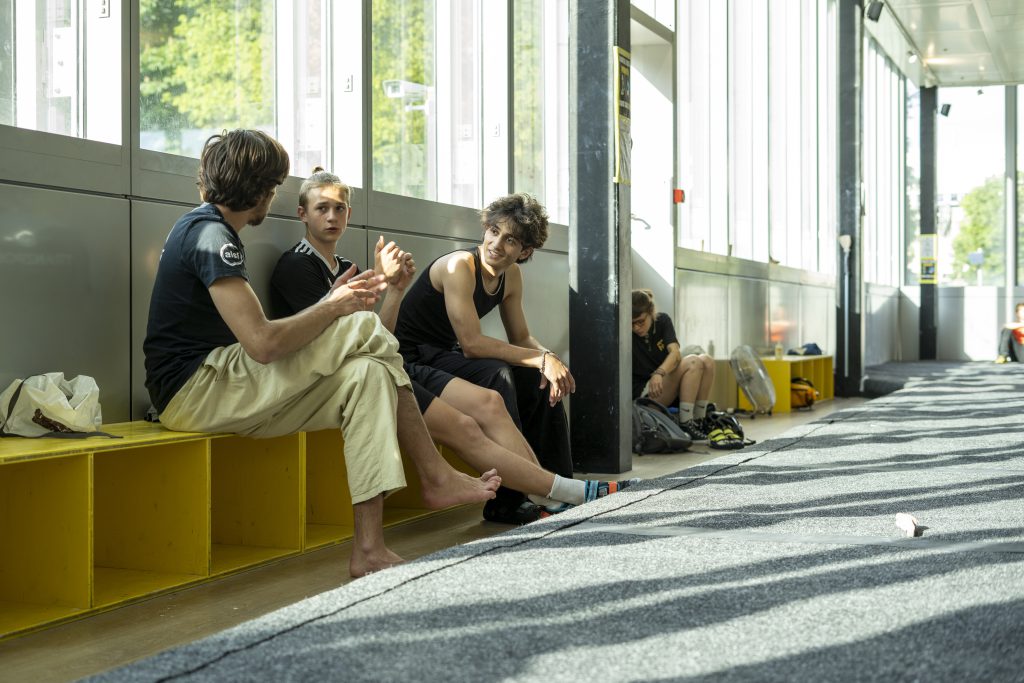
Discussion between participants and trainer during a Rookie Slash climbing course.
Reflection on the exercice
This blog and the deep personal reflection it contains were written as part of my Masters program in Communication for Social Change at Malmö University. It is a collaborative effort in which I worked with group to explore various aspects related to the role of ICT in aid and development. As part of this exercise, we delved deeper into the issues involved, and not only shared valuable ideas, but also worked together on the design and planning of the blog.
Overall, it was an incredibly rewarding experience, both personally and professionally. I firmly believe that the ability to collaborate effectively in the digital realm is a valuable skill in today’s professional world. What’s more, the content of this subject is closely linked to my day-to-day professional experience. It prompted deep personal reflection and interesting discussions with my colleagues and program participants.
I hope that, in the near future, we will be able to put the wise recommendations of academia into practice, bridging the gap between theory and practice. Perhaps this will be the subject of a future blog.
Stay tuned!
Reference List
Denskus, T. (2019). Blogging and curating content as strategies to diversify discussions and communicate development differently. Aidnography.
Denskus, T., & Papan, A. (2013). Reflexive engagements: The international development blogging evolution and its challenges. Development in Practice, 23(4), 435-447.
Noske-Turner, J. (2023). Communication for Social Changemaking: A “New Spirit” in Media and Communication for Development and Social Change? International Journal of Communication, 17(2023), 2944–2966.
Peace Direct. (2021). Time to Decolonize Aid: Insights and Lessons from a Global Consultation. London: Peace Direct.


